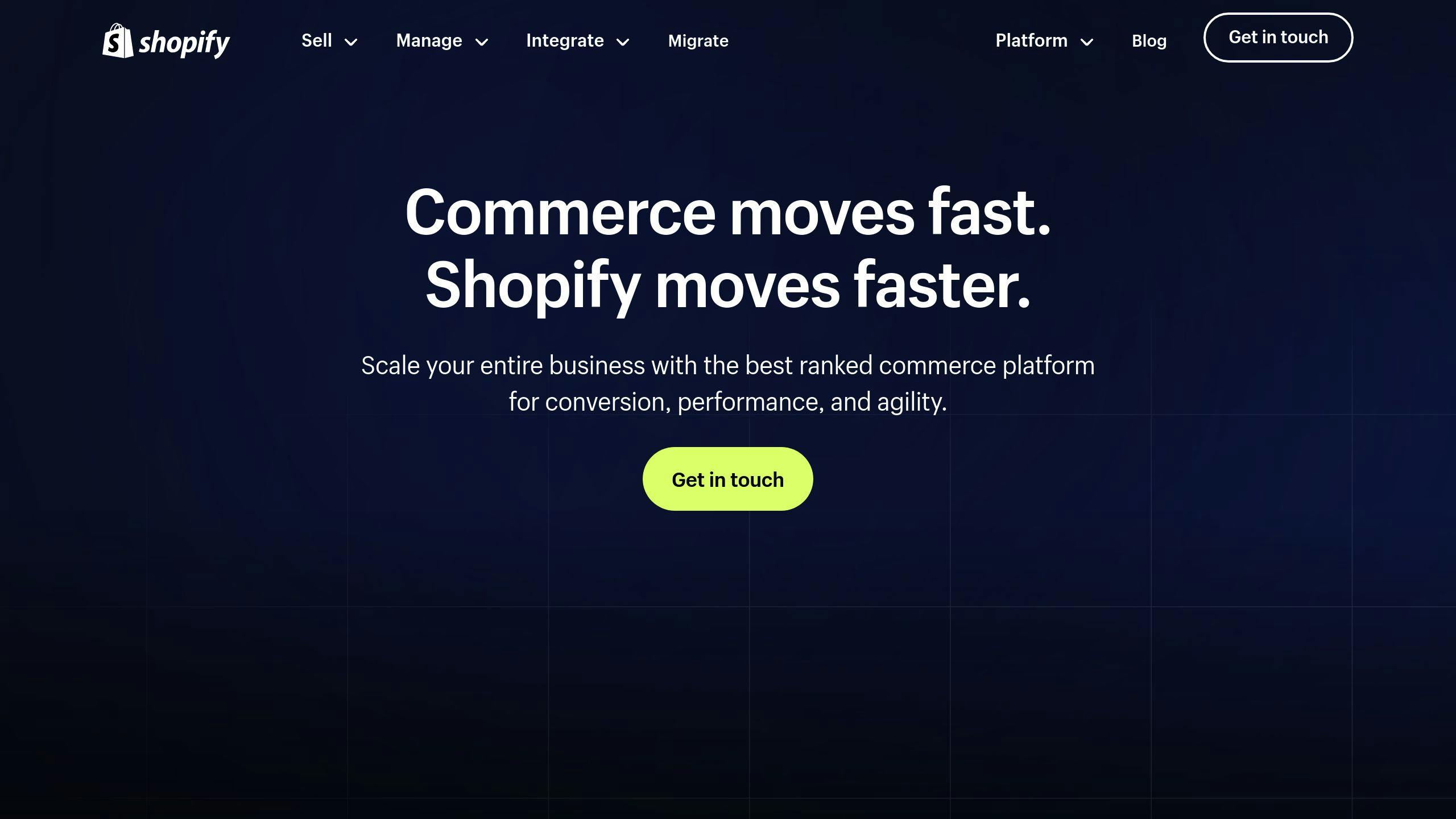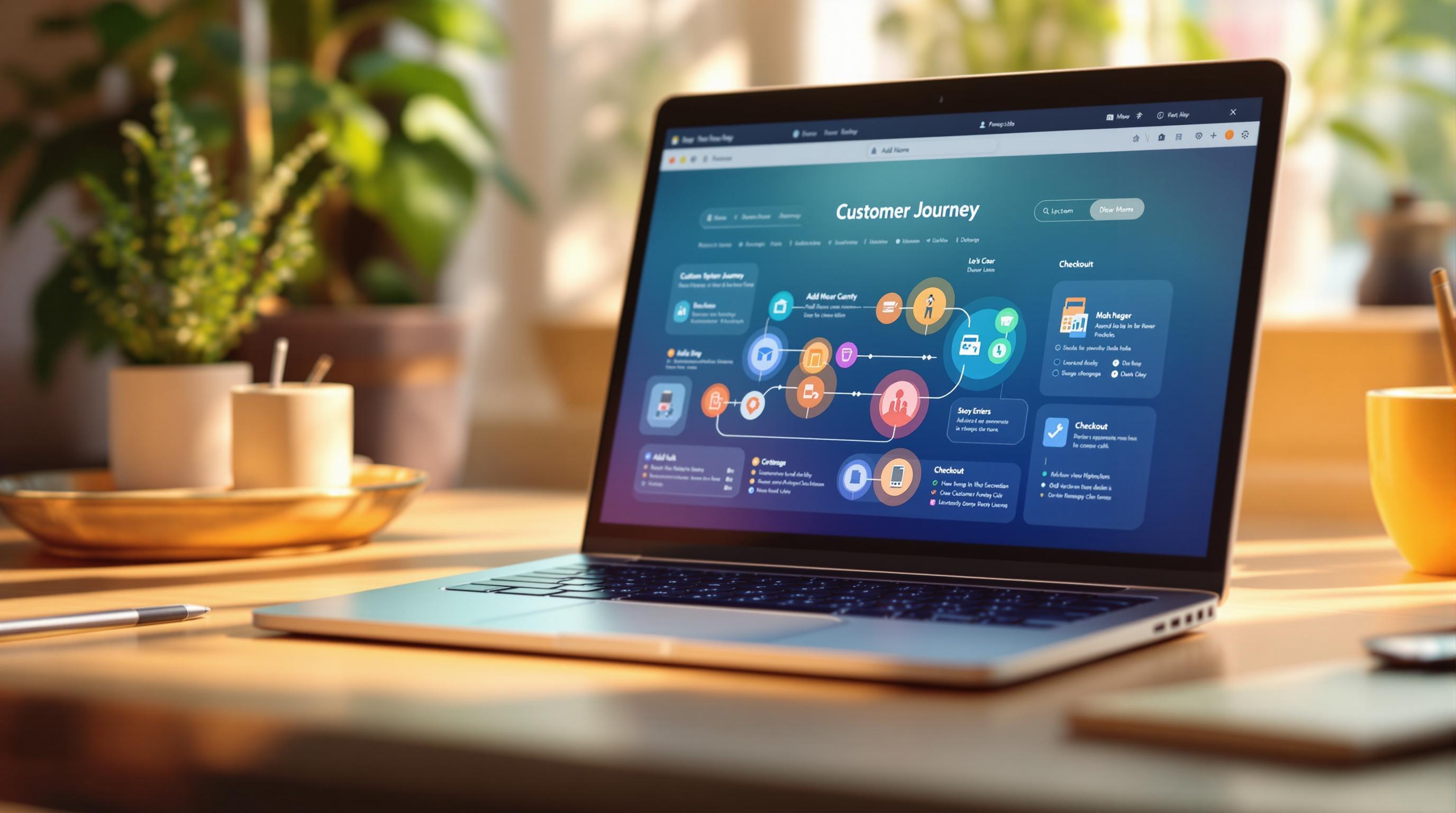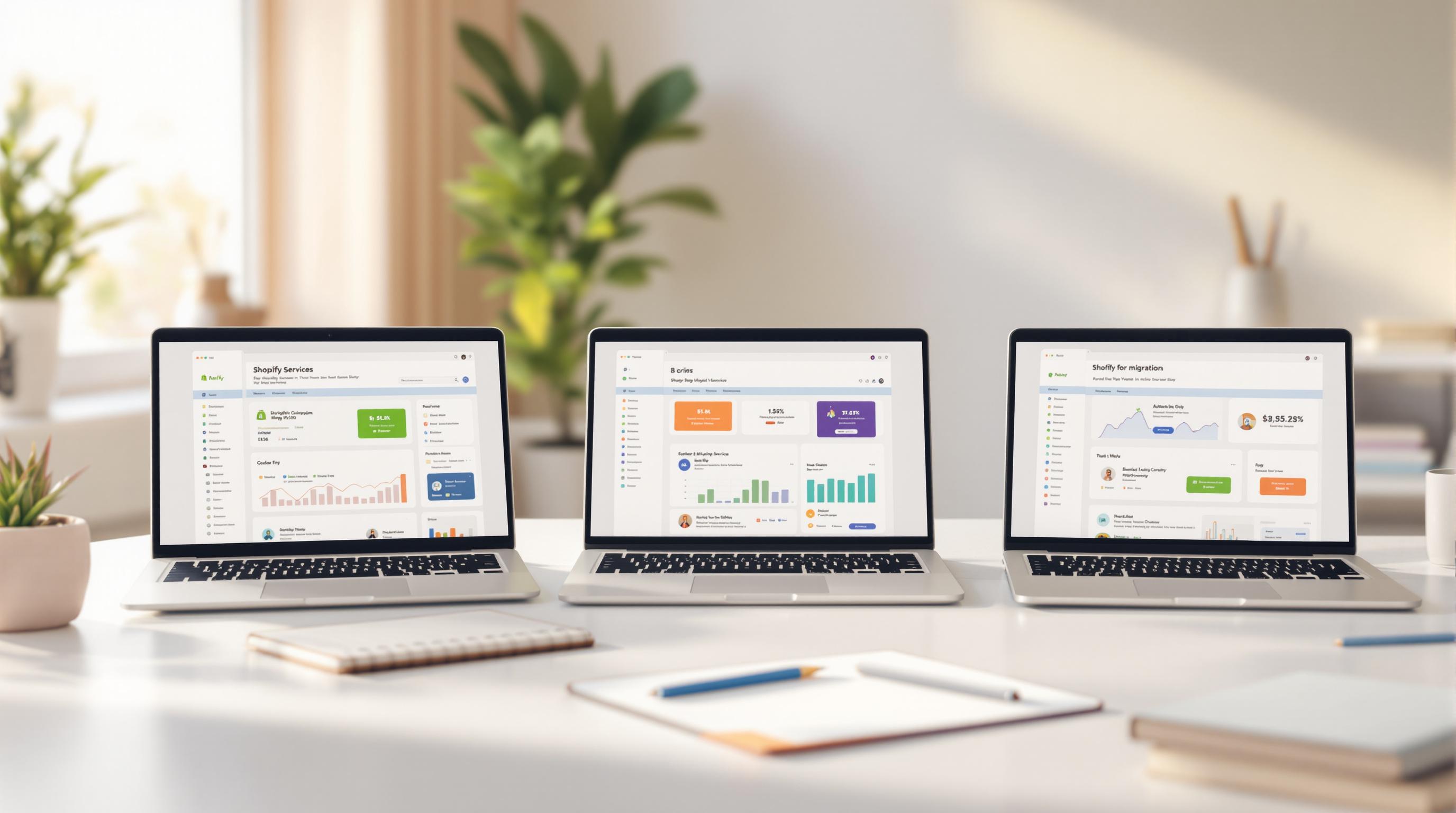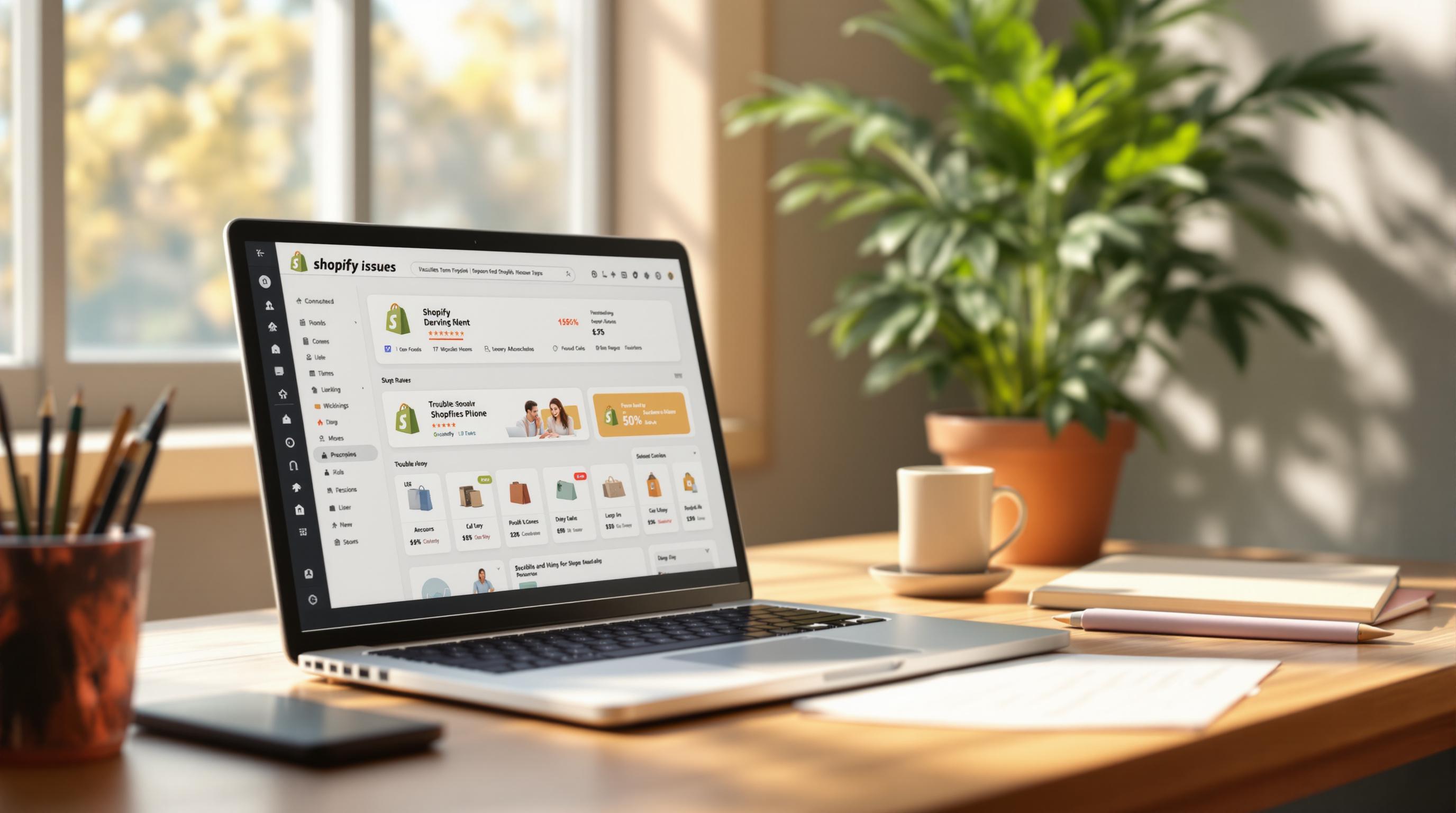Looking for the right Shopify developer? Here's what really matters:
- Technical Skills: Mastery of Shopify's Liquid, APIs (REST/GraphQL), HTML, CSS, and JavaScript for building functional, responsive stores.
- Shopify Plus Expertise: Essential for scaling enterprise-level stores with advanced features like custom checkouts and automation.
- Theme Customization: Ability to modify pre-built themes or create unique designs that look great and function seamlessly on all devices.
- App Integration: Skills in building or integrating apps to enhance store functionality and automate workflows.
- SEO & Performance: Optimizing site speed and structure to boost search rankings and conversions.
- Communication & Problem-Solving: Clear updates, quick fixes for issues, and keeping projects on track.
- Project & Budget Management: Delivering results on time, within budget, while focusing on must-have features first.
Key takeaway: The right developer doesn’t just build your store - they help your business grow by combining technical expertise with practical problem-solving. Ready to find yours? Let’s dive deeper into each criterion.
Related video from YouTube
1. Key Technical Skills
Want to build a Shopify store that looks great and works even better? You'll need a developer who knows their stuff. Here's what to look for.
Shopify Tools and Features
Your developer needs to be fluent in Shopify's own language - Liquid. It's not just another templating language; it's built specifically for e-commerce. A developer who knows Liquid inside and out can do cool things like create custom product pages that show different prices for your wholesale buyers, helping you boost those B2B sales.
They should also be pros with Shopify's APIs (both REST and GraphQL). These tools help connect your store to other apps and services. Plus, they need to know their way around Shopify's admin tools to handle things like payments and inventory. Picture this: setting up your store to accept multiple currencies so you can sell worldwide without breaking a sweat.
Front-End Development Knowledge
HTML, CSS, and JavaScript aren't just buzzwords - they're the building blocks of your store's look and feel. A good developer uses these tools to create features your customers will love, like a product carousel that suggests items based on what shoppers are viewing.
Here's an eye-opener: 58% of people browse the web on their phones in 2024. That's why your store needs to work perfectly on every screen size. Google loves mobile-friendly sites too, so this isn't just about looking good - it's about being found online.
Back-End Integration Skills
The magic happens behind the scenes with back-end integrations. Your developer should know how to connect your store with tools that make your life easier. Think HubSpot for tracking customer data or ShipStation for handling orders automatically.
Need something more complex? A skilled developer can link your store to big systems like NetSuite, making inventory and order management a breeze. These connections turn manual tasks into automated workflows, saving you time and reducing errors.
2. Shopify Plus Experience

Why Shopify Plus Experience Matters
Want your online store to handle massive growth without breaking a sweat? That's where a developer with Shopify Plus know-how comes in. They'll help you squeeze every drop of power from the platform, whether you need custom tools or lightning-fast performance for your enterprise store. Shopify Plus isn't just another e-commerce platform - it's built specifically for businesses that move serious volume.
Customization for Complex Stores
Need a store that breaks the mold? Shopify Plus lets developers create exactly what you need. Take Gymshark - they're crushing it in the fitness apparel world using Shopify Plus to manage their huge product line and handle tons of shoppers at once. Developers can build custom checkouts, set up smart pricing that changes based on who's buying, and add special features that boost your bottom line.
Features for Large Businesses
Here's what sets Shopify Plus apart: it comes packed with tools to make your life easier. You get automation that handles tedious tasks, room for as many team members as you need, and deep data insights to guide your decisions. Plus, the platform grows right along with you - perfect for taking your business worldwide.
But that's not all - Shopify Plus has your back with 24/7 priority support and gives you a dedicated success manager. When you're running a big e-commerce operation and hit a snag, having experts on speed dial is pure gold.
Think of Shopify Plus expertise as your foundation - but it's the developer's design skills that'll make your store pop and keep customers coming back for more.
3. Customizing Themes and Design
Want to make your Shopify store stand out? Let's talk about how to transform a basic theme into something that captures your brand's personality and keeps customers coming back.
Modifying Pre-Built Themes
Pre-built Shopify themes are just the beginning. With the right tweaks, you can turn a standard template into a store that feels made just for you.
Take Allbirds for example. They've turned a basic theme into a clean, minimalist showcase that puts their eco-friendly products front and center. How? Through smart use of Shopify's Liquid code and custom templates that highlight their sustainability story.
But it's not just about looking pretty. Smart customization means adding features that work hard for your business:
- Product sliders that show off your best items
- Eye-catching promo banners that boost sales
- Call-to-action buttons that get clicks
And when you need extra tools? A good developer makes sure your third-party apps (like loyalty programs or analytics tools) fit right in without slowing things down.
Picture a product page that does it all: shows related items, displays customer reviews, and makes it super easy to hit that "Add to Cart" button. That's what smart customization looks like.
Responsive Design Skills
Here's a fact that might grab your attention: 60% of e-commerce traffic comes from mobile devices. That means your store needs to look great and work smoothly no matter what device your customers use.
Think about what happens when a mobile page loads slowly - you lose sales. In fact, just a one-second delay can cut your conversions by 20%. That's why good developers focus on:
- Making your store look perfect on phones, tablets, and computers
- Speeding up load times by optimizing images and code
- Testing everything on different devices and browsers
They'll use tools like BrowserStack and Shopify's preview features to catch any issues before your customers do. Because in today's mobile-first world, your store needs to work flawlessly everywhere.
4. Building and Integrating Apps
Apps power your Shopify store's capabilities, letting you do more than what comes in the box. Whether you're building something custom or plugging in ready-made solutions, picking the right developer makes a huge difference.
Creating Custom Apps
Sometimes, standard Shopify features just don't cut it. That's where custom apps come in. Take a subscription box service - they might need a special app to handle automatic billing and shipping dates.
Here's what to check when looking at a developer's custom app skills:
- API Knowledge: Can they make your store talk smoothly with other services?
- Update Skills: Will they keep your app running as Shopify changes?
- Smart Solutions: Do they think ahead and build apps that grow with you?
Using Third-Party Apps
The Shopify App Store is packed with tools to run your business better. Good developers know how to plug these in without breaking anything. They'll check if apps play nice together, connect data properly, and fix problems fast.
Let's look at a real example: Chubbies, who sell men's clothes, uses Klaviyo for emails and Yotpo for reviews. Smart move - they bumped up their customer return rate by 20% in just one year.
What matters when adding apps:
- Will it work with your current setup?
- Can your developer connect everything properly?
- How fast can they fix things if something breaks?
Think about apps like Stocky - it watches your inventory automatically, cutting down on mistakes and paperwork. Or ShipStation, which lets customers track their orders in real-time, making them happier after they buy.
Next up: making sure your store runs fast and shows up when people search online.
sbb-itb-04e3801
5. Improving SEO and Performance
A well-built Shopify store needs more than just good looks - it needs to perform well and show up in search results. When picking a Shopify developer, make sure they know their stuff about speed optimization and SEO.
Improving Site Speed
Here's something that'll grab your attention: a single second of delay in loading time can cost you 7% of your sales. That's why speed matters so much. Here's what good developers focus on:
Your developer should work on three key areas:
- Smart Speed Fixes: They'll shrink images to the right size, clean up messy code, and use browser caching. These tweaks can make your site load twice as fast for returning customers.
- Mobile Speed: Google now looks at mobile sites first when ranking pages. Fast mobile loading keeps shoppers browsing longer and helps your search rankings.
- Speed Checking: Good developers don't just make your site fast once - they keep an eye on it with monitoring tools and regular speed checks across all devices.
SEO Techniques
Your Shopify developer should know how to get your store noticed in search results. Here's what they need to do:
Think of SEO like setting up shop in a busy mall - you want people to find you easily. Take Allbirds for example. They use terms like "sustainable shoes" in their content, which helps them rank better and connects with shoppers who care about the environment.
The developer should handle both the visible and behind-the-scenes SEO work:
- Write clear, keyword-rich product descriptions and meta tags
- Build a clean site structure with search-friendly URLs
- Keep tabs on how well the SEO is working and make changes based on real data
6. Communication and Problem-Solving
Strong technical skills alone don't make a great Shopify developer. They need to explain complex ideas simply and solve problems quickly to keep projects moving forward.
Communication and Problem-Solving Skills
A top Shopify developer needs to break down technical concepts into plain English and tackle issues head-on. Here's what makes them stand out:
Clear Communication
Good developers keep everyone in the loop and speak in terms clients understand. They'll:
- Send regular progress updates that highlight wins and flag potential roadblocks
- Skip the tech jargon when explaining things to non-technical clients
- Map out realistic project timelines, breaking work into clear phases like design, development, and testing
Problem-Solving in Action
E-commerce sites face plenty of challenges - from app integration headaches to slow loading times. The best developers spot these issues fast and fix them even faster.
Here's a real example: During Black Friday 2023, an electronics store's Shopify site started showing checkout errors due to heavy traffic. The developer spotted the server config issue and fixed it in just two hours, getting sales back on track.
When things go wrong (and they will), you want someone who can:
- Keep cool under pressure
- Find creative solutions to unexpected problems
- Work smoothly with third-party vendors to fix integration issues
- Handle sudden traffic spikes without letting the site crash
The right mix of people skills and problem-solving ability helps projects stay on budget and finish on time. Plus, it makes the whole process smoother for everyone involved.
7. Managing Projects and Budgets
Let's talk about how great Shopify developers handle projects and budgets. It's not just about writing code - it's about delivering results on time and within budget.
Meeting Deadlines
Want to know what makes Shopify projects succeed? It's all about smart time management. Here's the real deal:
A study by Mageplaza found something interesting: developers who stay in touch and tackle problems head-on are 40% more likely to hit their deadlines. That's huge!
Smart developers do two key things:
First, they map everything out. They break projects into clear chunks - theme work, customization, testing - and keep everyone in the loop. No surprises, no confusion.
Second, they roll with the punches. When things get tricky (like those pesky integration issues), they don't panic. They team up with support, switch things around, and keep the project moving.
Balancing Quality and Cost
Here's a money-saving secret: focus on what matters most, right now.
Good developers start with the basics - making sure your checkout works smoothly and your store looks great on phones. The fancy stuff can wait. This isn't just smart - it's strategic.
Here's something cool from Shopify's data: when stores build with growth in mind from day one, they cut their future development costs by 30%. That's real money saved.
Smart Budget Moves:
- Start with must-have features that drive sales
- Build in a way that lets your store grow without starting over
- Use what Shopify already offers before adding extra tools
Think of it like building a house - you need a solid foundation before adding a fancy deck. A good Shopify developer helps you build that foundation right, so your store can grow without breaking the bank.
Conclusion
Looking for a Shopify developer? Here's what matters most when making your choice.
The right developer does more than just build your store - they help grow your business. Let's break down what you need to look for:
Technical know-how is key. Your developer needs solid skills in HTML, CSS, JavaScript, and Liquid, plus a good grasp of Shopify's APIs and webhooks. Using Git for code management? Even better - it keeps everything organized, especially for bigger projects.
Got Shopify Plus? Make sure your developer knows their way around enterprise features. They should handle things like multi-currency support and workflow automation without breaking a sweat.
Theme work matters. Whether tweaking existing themes or building from scratch, your developer should create designs that work perfectly on phones, tablets, and computers.
Custom features need expert hands. The right developer can build custom apps or plug in third-party tools to add exactly what your store needs - no more, no less.
Speed sells. Your site needs to be fast and SEO-friendly. Google's data shows that just one second of delay can drop your sales by 20%.
Good communication saves headaches. Pick someone who explains things clearly and fixes problems fast. It'll save you time and money in the long run.
Smart budgeting pays off. Look for developers who:
- Break projects into manageable chunks
- Focus on must-haves first (like smooth checkout)
- Add extra features later
This approach can cut your future development costs by 30%, according to Shopify's data.
Want to make the right choice? Check their portfolio, talk to their past clients, and see how they solve problems. The best developer won't just build your store - they'll help your business succeed and grow.
FAQs
What skills are required for Shopify developer?
Want to become a Shopify developer? You'll need a mix of technical skills and e-commerce know-how. Here's what you should focus on:
Front-End Development HTML, CSS, JavaScript, and Liquid are your bread and butter. These tools help you build good-looking stores that work well. You'll use them to create custom product pages, add interactive features, and modify themes.
Shopify API Knowledge The API is your gateway to building better stores. You'll use it to connect stores with other tools like CRMs and create custom apps. It's how you'll automate tasks to make stores run more smoothly.
Strong Development Habits Good developers use Git for version control - it's how teams work together effectively. You'll need to test your designs on different devices and write clean code that's easy to maintain.
Technical SEO Skills Your code needs to be search engine friendly. This means writing clean HTML, setting up proper URLs, and making sure search engines can easily understand your store's structure.
Speed Optimization Nobody likes a slow website. You'll need to optimize images and code to keep pages loading fast. Quick load times keep shoppers happy and help turn browsers into buyers.
Think of these skills as your developer toolkit - each one plays a key role in building Shopify stores that perform well and make money.


